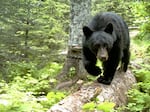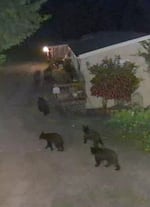Across Oregon, people are finding their garbage tipped over, bird feeders pulled down, and barbecue grills disassembled.
It’s time to beware of … bears.

A black bear walks across a fallen tree in an Oregon forest, always sniffing for food with its keen sense of smell. State wildlife officials say spring is a popular time for bears to forage for food that humans leave behind in trash cans or even caked on a barbecue grill.
Courtesy of U.S. Forest Service
Spring is a time of rebirth, warmer days, and bears rummaging for food. One person who knows this all too well is Patti Lundeen, who lives on a ranch in the rural Peaceful Valley area near Eugene.
“I got up early one morning to go feed my horses, and our deck was completely turned upside down,” Lundeen told KLCC. “It was a mama bear and some older cubs. I had a container of bird seed, in an old cast-iron pot with a lid. And they had strewn that all over.”
Lundeen said this was the first time living at her current home that she’s seen this kind of activity, but added that in driving around her neighborhood, she’s seen garbage strewn about by bears. Lundeen said she’s since relocated their garbage and secured the horse feed, which echoes precautions wildlife officials have shared.
“Even recycling, they’re gonna lick cans,” continued Lundeen. “They’re going to find the peanut butter container. They’re a big animal, they can destroy pretty much anything you’ve got going on.”
People are encouraged not to confront or otherwise engage with bears. Grills should be cleaned and stored after use, and pet food only kept inside, which can attract bears and other wildlife, putting one’s pet at risk. Putting out garbage the day off trash pick-up versus the night before is another way to keep bears from foraging into areas populated with humans.
The Oregon Dept. of Fish and Wildlife warns that a bear’s strongest sense is smell, and everything from trash cans to grill drippings can bring one to a residence. Once bears associate people with food, unpredictable and often tragic outcomes can follow, usually for the bear.

A surveillance camera captures a mother bear leading her three cubs by a rural home near Eugene in early May 2023.
Courtesy of Patti Lundeen / KLCC
ODFW officials say that a bear that loses its wariness of people and becomes conditioned to human-provided sources of food may be humanely killed. This is often the only option to protect humans and ultimately to protect the larger bear population from learning the same behavior.
Officials add that bears — like all wildlife — have a specialized diet that coincides with seasonal changes, so access to human-provided food can hurt their health, lead to conflict with humans, “and in many cases have fatal consequences.”
Bears also have a great memory when it comes to food, the ODFW explains. Not only will they remember where they have found food (including trash) but mother bears will share this knowledge with their cubs.
In a release, the ODFW says a community effort is vital to preventing problems with bears. “One person who feeds or attracts bears, intentionally or not, can pose a risk to everyone in the neighborhood. Living responsibly with black bears is possible and it’s up to everyone to do their part to keep humans safe and bears wild.”
People who want to report unusual bear activity can contact their local ODFW office. The same resource can be used for information on preventing conflict with these large and unpredictable animals.
The ODFW says to learn more about living with black bears, visit: https://myodfw.com/articles/help-keep-bears-wild.